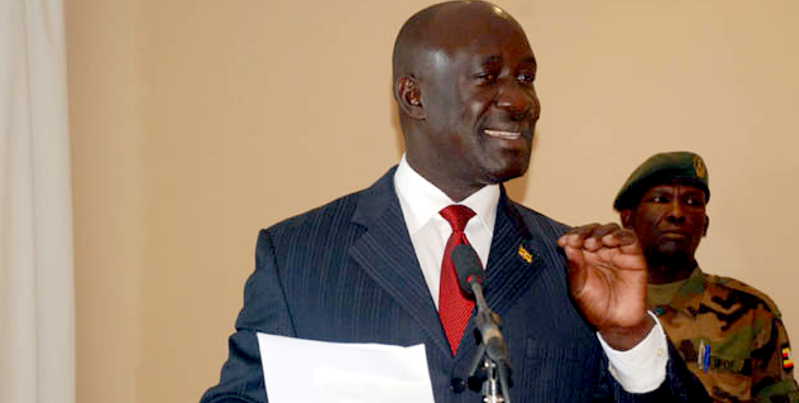News
Economic crisis looms as dry spell withers crops
Tax payer billions lost in uncoordinated agricultural interventions

Minister Musa Ecweru is worried about the huge task ahead for him as disaster minister due to a potential food shortage
Uganda is facing an imminent economic crisis because of the persistent dry spell that has scoched crops in most parts of the country.
Experts are warning that the dry spell is pushing millions of Ugandans who depend on farming for food as well as for business on the brink of hunger and poverty.
The State Minister for Disaster Preparedness Musa Ecweru warns that if it does not rain in the next two weeks, crops, especially cereals and legumes, will fail because most of them are either flowering or have past the critical flowering stage where they must get moisture in order to be able to put on food.
The scenario is attributed to an unusually very short first planting season of the year. Although the first planting season usually starts in March and lasts for three months till June, this year the rains in most parts of the country started rather late in April and ceased in May leaving most crops very young and vulnerable to the hot sun.
Minister Ecweru wrote in one daily this week that: “Our assessment of the whole country is that most of the crops like ground nuts, maize, beans and sorghum are withering and if it does not rain in the next two weeks, then the entire country will witness crop failure in the first season of 2016.”
Ecweru’s assessment of the situation is rather too optimistic according to most sources The Sunrise has talked to who paint a more desperate situation where most legumes such as beans, ground nuts and soy have been scotched by the longer than expected dry spell.
Emmanuel Mbeyagala, a research scientist at the National Semi-Arid Resources Research Institute (NaSARRI) in Serere came to the same conclusion as Minister Ecweru. He told The Sunrise that if it does not rain in the next two weeks, millions of farmers face a real threat of hunger.
“Most farmers here planted in April or early May and their crops are just about to flower which is a critical stage at which crops must have water. We’ve not had rain for several weeks now which is worrying,” says Mbeyagala.
More worrying perhaps, as Mbeyagala points out, the dry spell threatens to destroy/delay or disorganised important agricultural research experiments that are being carried out at NaSARRI and other research institutes in the country because many do not have functioning irrigation systems.
The impact of the dry spell on Uganda goes beyond causing hunger. As Mbeyagala pointed out: “People have invested heavily in buying seeds and on labour to prepare the land. If it does not rain, it will be a heavy blow to people in form of hunger, but also by deepening poverty,”
The problem is compounded by the country’s lack of storage facilities that has left most households dependent largely on fresh foods as well as on the vagaries of boom and bust spirals of the cereals market in the market.
Ssalongo John Ssebulime, a medium scale farmer at Ntungamo, a small town located a few miles from Mubende district told The Sunrise that their two months maize is almost lost after it flowered with no rain.
“Our hopes have faded about harvesting anything in maize.” Ssebulime said: “Many farmers of beans, millet and ground nuts have been hit by the drought and are no worried about the impending poverty because the garden is the biggest source of incomes for majority of the people.”
Ssalongo Ssebulime says beans were mostly destroyed by heavier-than-usual rains that came at the start of the season. He was only saved by spraying the crop with some pesticides.
Ssebulime could not hide his frustration with what he called unyielding promises by the government towards modernising agriculture by reducing reliance of rain-fed agriculture.
He said: “The current situation should be a wake up call for the government to start to walk its talk on agriculture modernisation. The government needs to support farmers to be able to cultivate whether or not there is rain. At the start of the rain season, it rained so heavily and all the water was lost into swamps. The government should have helped us to store this water in dams so that we could use it later to save our crops.”
Indeed Ssebulime’s complaints are not misplaced. The government has sung the song of modernisation of agriculture for many years without implementing the high-sounding proposals including mechanising farm operations as well as supporting irrigation activities.
Most of these promises have failed to materialise which has kept agriculture in a state of stagnation with far reaching implications.
Implications
If the current drought continues through to July as is predicted by meteorologists, poverty will deepen among millions of households with far reaching implications on nutrition, education, and purchasing power of people which will hurt businesses.
Reduced supply of agricultural products will certainly push up the rate of inflation since food expenses account for the biggest proportion of people’s overall expenditure in Uganda, according to the Uganda Bureau of Statistics (UBOS).
The dry spell is a further indictment on the part of government and its poor planning process. Despite the government’s failure to support irrigation, the government went ahead to launch a multi-billion shilling agricultural intervention code-named Operation Wealth Creation.
Under OWC, the government, with the help of veteran soldiers has supplied seedlings of coffee, fruits as well as seeds to farmers. Without an accompanying irrigation facility, most of the crops are likely to fail with the corresponding loss of billions of tax payer money.
Comments


























